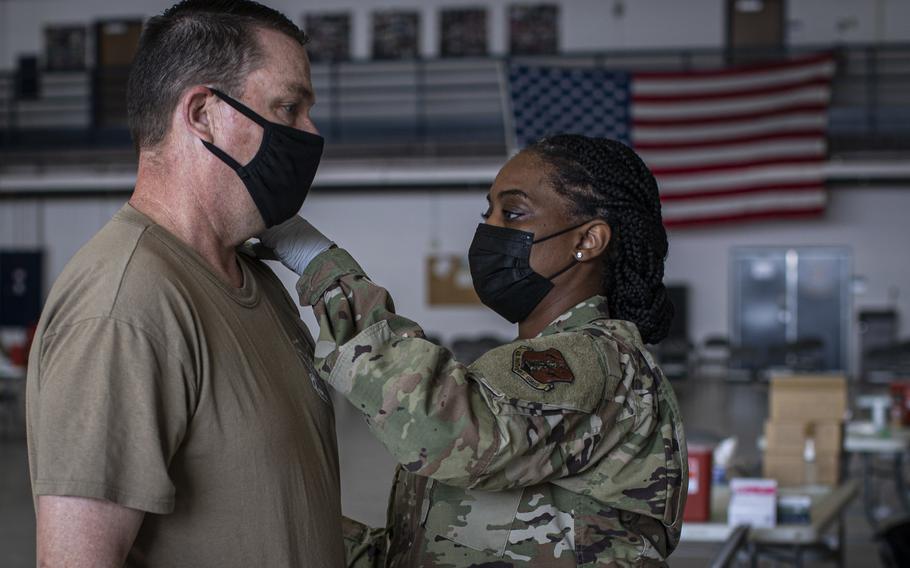
Air Force Brig. Gen. Patrick Kennedy, assistant adjutant General-Air and commander of the New Jersey Air National Guard, received the coronavirus vaccine booster shot Nov. 6, 2021, at the 108th Wing at Joint Base McGuire-Dix-Lakehurst, N.J. (Matt Hecht/U.S. Air National Guard)
Stars and Stripes is making stories on the coronavirus pandemic available free of charge. See more stories here. Sign up for our daily coronavirus newsletter here. Please support our journalism with a subscription.
A federal judge in Georgia on Tuesday temporarily blocked the Air Force from punishing an officer who filed a lawsuit in January after she was denied a religion-based exemption from the mandatory coronavirus vaccine.
U.S. District Court Judge Tillman E. Self III granted a preliminary injunction for the unnamed Air Force Reserve officer in an order published Tuesday that labeled the service’s process for granting religion-based coronavirus vaccine exemptions “illusory and insincere.”
The judge, who is based in Macon, Ga., ruled the Air Force had likely violated the officer’s First Amendment rights when the service denied her initial request for a religion-based waiver and her subsequent appeal of that decision in December, while service officials as of Feb. 8 approved exemptions for 3,313 airmen for medical or nonreligious administrative reasons.
“It seems illogical to think, let alone argue, that plaintiff’s religious-based refusal to take a [coronavirus] vaccine would ‘seriously impede’ military function when the Air Force has at least 3,300 other service members still on duty who are just as unvaccinated as her,” Self wrote in his ruling. “The only difference is that plaintiff is unvaccinated because she followed her religion and the others were granted either a medical or administrative exemption from receiving a [coronavirus] vaccine.”
When the unnamed officer, who is based at Robins Air Force Base, Ga., filed her lawsuit on Jan. 6, the Air Force had not granted any religion-based accommodations, but the service has since granted nine. The service has denied 3,665 requests for a religion-based waiver and was still considering 3,288, as of Feb. 8, according to service data. The Air Force had removed 142 active-duty airmen from the service for refusing the vaccine, the service said last week.
“The Department of the Air Force is aware of the preliminary injunction and will abide by the court’s order until the matter is legally resolved. The Air Force has no other comments about this ongoing litigation,” Air Force spokeswoman Ann Stefanek said in a statement.
The Air Force officer’s lawsuit describes her as a 25-year veteran who has never faced disciplinary issues during her career. It states she serves in “an administrative position in the Air Force Reserve” that would not “be tasked to deploy” or likely to engage in physically demanding military operations. She is also a civilian employee of the Air Force and works at Robins Air Force Base in her nonuniformed role. She has filed a separate request for a religion-based exemption to the vaccine in her civilian capacity, but the service had not ruled on it before a federal judge in Texas last month temporarily stopped the government from enforcing President Joe Biden’s vaccine mandate for federal civilian workers.
The officer plans to retire from the Air Force “under protest,” if she is not ultimately exempted from the vaccine, which Defense Secretary Lloyd Austin mandated for U.S. troops in August.
The Air Force officer argued in her lawsuit that she cannot take the vaccine because as a Christian she is opposed to abortion as “a grave evil.”
All three coronavirus vaccines approved for use in the United States were tested and developed using fetal cell lines, which are laboratory-grown cells derived from abortions performed several decades ago, according to the National Institutes of Health. Several religious authorities, including the Vatican, have said the vaccines were morally acceptable for its congregations.
“Plaintiff sincerely believes that receiving a vaccine that was derived from or tested on aborted fetal tissue in its development would violate her conscience and is contrary to her faith,” the officer’s lawsuit reads. “… Fidelity to her religious beliefs is more important to plaintiff than her career and compensation, but the Constitution prohibits defendants from forcing her to choose between her beliefs and her employment.”
The lawsuit also states the officer contracted the coronavirus in 2020 and a coronavirus antibody test in December 2021 showed she continued to have antibodies in her system. She is also willing to “take regular [coronavirus] tests when working in-person on the base, wear a mask, socially distance and work remotely as appropriate,” according to the lawsuit.
She is at least the 38th U.S. service member granted a preliminary injunction barring the Pentagon from punishing her for refusing the vaccine. A federal judge in Texas granted 26 Navy SEALs and nine other Navy special operators a preliminary injunction against punishment in January. A federal judge in Florida this month issued a preliminary injunction protecting a Navy officer and Marine Corps officer from punishment in a separate case.
All the judges have stopped short of granting a nationwide injunction to protect all service members from punishment for refusing the vaccine. In her lawsuit, the Air Force officer had sought such an injunction, Self wrote in his order.
However, he added, her allegations in the case “simply don’t warrant a nationwide injunction.”
Self, who served four years in the Army as an artillery officer before becoming a lawyer, wrote the Air Force should reconsider its process for religion-based exemptions.
“With such a marked record disfavoring religious accommodation requests, the court easily finds that the Air Force’s process to protect religious rights is both illusory and insincere,” he wrote. “In short, it’s just theater.”